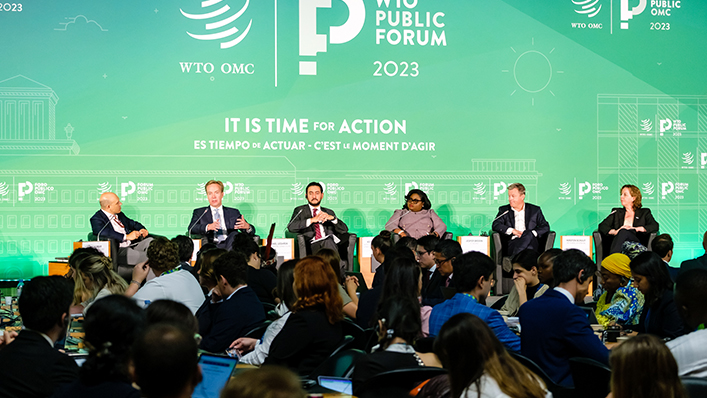
The session opened with a video message from Irish Taoiseach Leo Varadkar, who said the WTO is ideally placed to discuss how trade can be a force for good in the fight against climate change.
“Without open trade, we will not secure our ambitions for developing the green economy in areas such as offshore wind, energy, climate, tech and sustainable food,” the Irish Prime Minister said.
Daniel Legarda, Ecuador’s Minister of Foreign Trade, pointed to the establishment last year of the Coalition of Trade Ministers on Climate as an example of how governments are increasingly focusing on the nexus between trade and the environment to promote coherent policies that facilitate climate-resilient sustainable development.
“It’s not a discussion about whether we want to trade or not,” he said. “It’s how can we make trade an enabler of a better climate policy, not only at the multilateral level, but also in initiatives that can be taken at the regional or country level as well.”
Keisal Peters, Saint Vincent and the Grenadines’ Minister of Foreign Affairs and Foreign Trade, noted that climate change was an existential issue for her island state.
“We have been making that extra push as it relates to renewable energy,” she said. “But there’s a cost, and for countries like Saint Vincent and the Grenadines, with a small economy, it’s very difficult for us, which leads to the question of financing and how we are able to acquire this new type of energy.”
“I’m very happy that the WTO has had this Public Forum because it gives us the opportunity to have focused discussions on these issues. “We have to look at ways in which developing countries like Saint Vincent and the Grenadines can benefit from this type of technology.”
Børge Brende, President of the World Economic Forum, said it was important that governments refrain from imposing unnecessary measures that hinder trade in green goods and technologies.
“For example, solar panels, wind turbines, we need the market to flow in the interest of mitigating CO2 emissions (but) today there are a lot of barriers,” Mr Brende said. “There is a lot of red tape, but there’s also a lot of tariffs on these new technologies which make it more expensive for those that want to roll it out. So here I think trade can be an agent for change when it comes to the climate.”
Several speakers underlined the need to address economic incentives that continue to distort trade in favour of harmful practices, and in particular the need to phase out subsidies for fossil fuels.
Kirsten Schuijt, Director-General of WWF International, said the Fisheries Subsidies Agreement which WTO members concluded last year was a significant step towards addressing distorting subsidies in favour of sustainable practices.
“It’s a great example of changing within the system, shifting away from harmful subsidies and harmful incentives to something that’s very positive,” Ms Schuijt said.
Jesper Brodin, Chief Executive Officer of the Ingka Group, IKEA, said stepping up public-private collaboration will be critical in addressing the climate change challenge.
“We need to collaborate with public sectors much more in order to help us to set the stage for the new economy, so that we do the right investments not in five years or ten years, but we can do them now,” Mr Brodin said.
Share
Reach us to explore global export and import deals